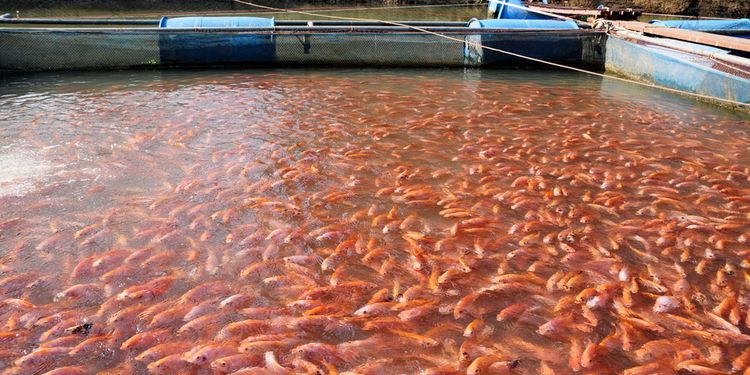This Common Fish Is Dangerously Unhealthy
When it comes to healthier eating, one of the first things people do is start backing off the red meat in favor of more fish. After all, fish is high in protein and tends to be lower in fat, and the fat it does have is the good kind.
The problem is that all fish are not created equal. Would you be surprised to find out that there are fish out there that are far worse for you than bacon? Well there are, and they include pretty much any fish that is farm-raised instead of caught in the wild.
The most popular farm-raised fish in the US is tilapia, mostly because it’s so widely available and very inexpensive, but other common farm-raised fish include salmon, catfish, bass, and cod. When farm-raised with mass production techniques, these fish take on sinister properties.

A Fish That’s Bad to the Bone
Whether you’re talking about animals or plants, any time you turn farming into mass production, your monoculture runs into all kinds of problems, primarily from pests and diseases. To remain successful and profitable, farmers must fight those diseases and pests. They usually do this with toxic chemicals in the form of pesticides, herbicides, and fungicides.
Farm-raised fish contain as many as 10 times the carcinogenic pollutants as wild fish thanks to what farmers use for feed, which often includes major amounts of animal feces from chickens, ducks, and even pigs.
As with other factory farms, when you raise lots of the same animal in crowded conditions, they become sick more easily. As a result, farmers turn to antibiotics to keep things under control. Farm-raised fish have high levels of antibiotics in them, and it is now widely accepted that the over-use of antibiotics is contributing to the evolution of resistant super-bugs.
Another problem at fish farms is infestations of sea lice, which farmers control by using pesticides. Wild fish exposed to the same levels of pesticides used on fish farms die outright. These pesticides eventually find their way into the world’s oceans, where they are accumulating in the bodies of other marine animals.
Farm-raised mussels have six times the level of dibutylin— a toxic chemical linked to metabolic and immune disorders such as asthma, obesity, and allergies— as mussels obtained in the wild. Farm-raised salmon bought at grocery stores contains high levels of dioxin, another toxic chemical that can lead to cancer and all kinds of other health problems.
All farm-raised fish have more of what you don’t want in a fish— carcinogenic pollutants in the form of pesticides, antibiotics, dibutylin, and dioxin.

A Fish That Lacks the Good Stuff
To add insult to injury, farm-raised fish are also nutritionally deficient compared to their wild counterparts. The good omega-3 fatty acids you want to get from eating fish are less usable by the human body when they come from farm-raised fish.
Also, because these fish are held captive in cramped quarters, they tend to have more omega-6 fats, which are the bad kind. Perhaps this is why tilapia can end up contributing to inflammation rather than reducing it. A study from Wake Forest University School of Medicine revealed that the inflammatory potential of tilapia exceeds that of both hamburger and bacon, as presented in the Journal of the American Dietetic Association.
The general rule of thumb emerging here is clear: farm-raised fish have less of the good stuff fish are supposed to have and way more of the bad stuff fish shouldn’t have at all.

Summary
The mass production of any agricultural product in giant mono-crops forces the use of harmful techniques that lower the quality of the final product, often making it downright bad for you to consume. In the world of poultry, you’ve probably heard of cage-free, pasture-raised chickens raised without the use of antibiotics. The same thing goes for cattle, where health-conscious consumers want meat from grass-fed, pasture-raised animals free from antibiotics. We can now add fish to the list— farm-raised fish are bad for you. Wild-caught fish is always a better choice.
The lesson for healthy eaters is to always find out the source of the food you’re purchasing. You want to know if the fish you buy is farm-raised or wild-caught. When you’re eating out and ordering salmon, ask your server if your meal is farm-raised or wild-caught. As a general rule of thumb, Pacific or Alaskan salmon are wild-caught, while Atlantic salmon is most often farm-raised.
